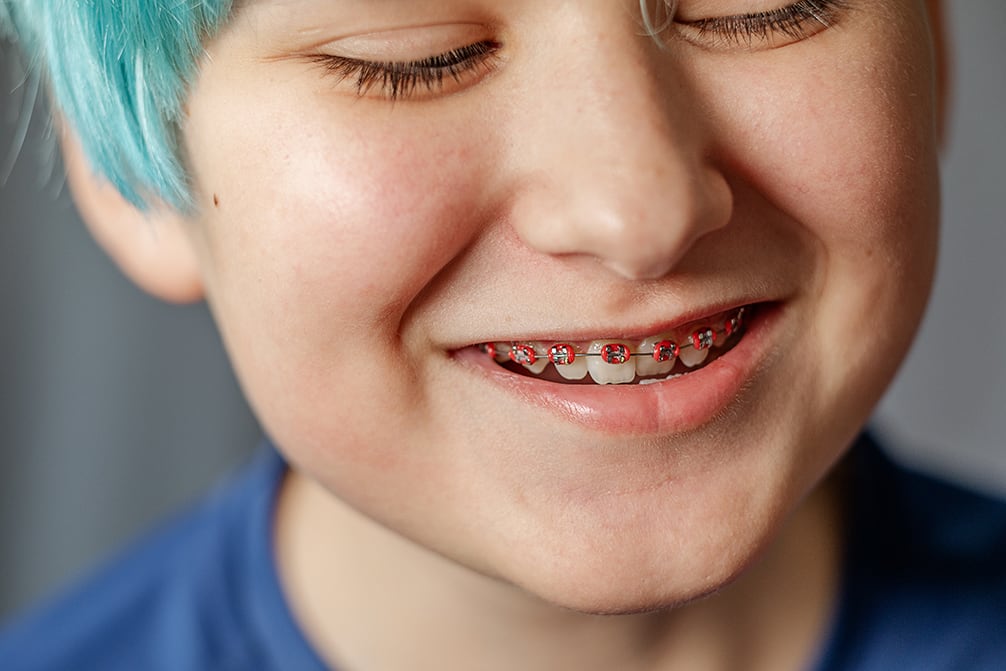Having uneven or misaligned teeth can have a negative impact on your confidence. Fortunately, orthodontic concerns are usually easy to correct with the help of braces. Adults, teenagers, and children with uneven smiles can transform their teeth and boost their confidence by getting braces from Delaware Smile Center’s in-house orthodontist, Dr. Sophia Usmani.
Braces are small devices placed on teeth that slowly pull them into alignment. While wearing braces, you will visit the orthodontist periodically to have them tightened so they can continue to move your teeth. The length of time people wear braces varies widely depending upon the severity of their teeth misalignment, and can range from 6 months to 2 years.
While braces are suitable for people of all ages, it is easier for them to straighten the teeth of children and teenagers. This is because the bones underneath the gums are still growing and tend to shift teeth easily. Braces are still a great option for adults, but the prime age to get them is typically 10 to 14. For adults with mild or moderate misalignment, an alternative treatment like 6 Month Smiles may be able to provide the desired results in less time.
There are many different types of braces for you to choose from. Options can include straightening upper, lower or both, which can then help determine which type is best for you. Also, the severity of your misalignment, age, budget, and personal preference are factors to consider before choosing one of the following types:
On average, it may take one to three years to complete orthodontic treatment with traditional braces, depending on the complexity of the adjustments needed. With that in mind, it is important to note that each individual is unique, so the duration of orthodontic treatment will vary from patient to patient. In most cases, regular check-ups with Dr. Usmani can be expected about every four to eight weeks during the treatment process. These “maintenance” appointments are necessary to adjust the braces for corrections that appropriately address your dental alignment and bite concerns. Once you have completed treatment with braces, a customized retainer should be worn to maintain the results over time. In many cases, the retainer will eventually only be necessary to wear while sleeping. During a consultation with Dr. Usmani, she will be able to evaluate your concerns and provide a more precise estimate for the treatment timeline.
While traditional braces can produce reliable results, especially for severe or complex orthodontic concerns, there are other treatment options available that may provide suitable alternatives to braces, depending on the needs of the patient. For individuals who would prefer a more discreet appliance, Invisalign® offers a system of clear, flexible, removable aligner trays that can improve mild to moderate cases of teeth misalignment, gaps, crowding, and bite irregularities. Additionally, 6 Month Braces may be an ideal solution for some patients. This technique focuses on treating the front teeth with the goal of producing optimal results in about six months. Porcelain veneers may also be considered as an alternative to orthodontic treatment in order to conceal spaces and mild to moderate misalignment with custom-designed porcelain restorations that cover the front and sides of the affected teeth. Dr. Usmani can discuss all of the options that are best suited for your orthodontic concerns and goals during the consultation.
Following the initial placement of traditional metal braces, it is normal to experience some degree of mild discomfort and soreness for the first few days. These effects should dissipate as your mouth adjusts to the braces. The same reaction can be expected after routine adjustments when the braces are tightened. To help alleviate these symptoms, we may recommend taking over-the-counter oral pain medication as directed, gently applying a cold compress, and rinsing with warm saltwater. If you feel pain that is beyond mild discomfort, please contact our office.
Although each person is different, having sensitive teeth is a common occurrence, affecting as many as 1 in 8 people. For those with sensitive teeth, braces typically do not hurt, but you may feel sore right after having them adjusted. Getting your routine scheduled adjustment can cause teeth to change their position which may cause some discomfort. The good news is that this type of sensitivity should only last a day or two and is easily treatable.
If you are experiencing sensitivity issues, Delaware Smile Center can help you find solutions and is always available for any questions you have. For patients who are particularly concerned about the impacts of braces, we can also discuss alternative orthodontic treatments, such as Invisalign®.

There are many variables that determine the total cost of orthodontic treatment, such as the type of braces that are selected, the complexity of the concerns being addressed, the projected duration of treatment, materials used, and other factors. Therefore, the price of braces differs from patient to patient. After a consultation with Dr. Usmani, our team will provide a detailed estimate of costs for orthodontic treatment and review any questions you may have. In many cases, dental insurance often covers at least a portion of orthodontic expenses. We can help you review your insurance benefits to determine whether coverage is offered for braces. Our office also works with trusted third-party healthcare lenders that provide financing options for qualified applicants.
Braces can bring your teeth into alignment and give you a beautiful smile you can be proud of, so don’t wait to find out if they are a good fit for you. Contact Delaware Smile Center today to get started.